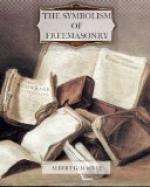3. These truths of God and immortality were most probably handed down through the line of patriarchs of the race of Seth, but were, at all events, known to Noah, and were by him communicated to his immediate descendants.
4. In consequence of this communication, the true worship of God continued, for some time after the subsidence of the deluge, to be cultivated by the Noachidae, the Noachites, or the descendants of Noah.
5. At a subsequent period (no matter when, but the biblical record places it at the attempted building of the tower of Babel), there was a secession of a large number of the human race from the Noachites.
6. These seceders rapidly lost sight of the divine truths which had been communicated to them from their common ancestor, and fell into the most grievous theological errors, corrupting the purity of the worship and the orthodoxy of the religious faith which they had primarily received.
7. These truths were preserved in their integrity by but a very few in the patriarchal line, while still fewer were enabled to retain only dim and glimmering portions of the true light.
8. The first class was confined to the direct descendants of Noah, and the second was to be found among the priests and philosophers, and, perhaps, still later, among the poets of the heathen nations, and among those whom they initiated into the secrets of these truths. Of the prevalence of these religious truths among the patriarchal descendants of Noah, we have ample evidence in the sacred records. As to their existence among a body of learned heathens, we have the testimony of many intelligent writers who have devoted their energies to this subject. Thus the learned Grote, in his “History of Greece,” says, “The allegorical interpretation of the myths has been, by several learned investigators, especially by Creuzer, connected with the hypothesis of an ancient and highly instructed body of priests, having their origin either in Egypt or in the East, and communicating to the rude and barbarous Greeks religious, physical, and historical knowledge, under the veil of symbols.” What is here said only of the Greeks is equally applicable to every other intellectual nation of antiquity.




